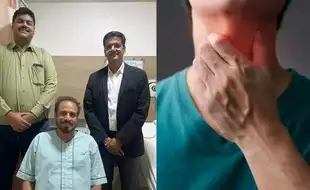News
4 Common Drugs That Increase Your Chances Of Erectile Dysfunction; Are You At Risk?

There are many drugs you may be taking for treating specific conditions, or pills as common as painkillers and anti-histamines
Erectile dysfunction or ED - also known as impotence, is a sexual dysfunction that makes it difficult to get or maintain an erection. According to experts, erectile dysfunction affects millions of men around the world – with around 50 per cent of men between the ages of 40 and 70 years having it at some point in life.
There are various reasons men have the condition, which includes high blood pressure levels, cholesterol, and diabetes, apart from mental health issues like stress, depression, and anxiety. However, there are times when the culprit may in fact be inside your medicine cabinet.
How does medication lead to ED?
Doctors say medication plays a massive role in causing this condition. There are many drugs you may be taking for treating specific conditions, or pills as common as painkillers and anti-histamines. However, the four medicines that could increase your risk of ED, include:
Beta-blockers
Beta-blockers reduce high blood pressure levels. Also known as antihypertensives, these medicines are a common side effect of erectile dysfunction as they lower testosterone while also impacting blood flow - both requirements for achieving and maintaining a healthy erection.
According to experts, if you get ED shortly after starting treatment with any BP drug, speak with your doctor as they can substitute for a different one. Keep in mind that it can take anywhere from several days to several weeks after stopping a high blood pressure medication for erections to return.
Antidepressants
Doctors say some antidepressants like Selective serotonin reuptake inhibitors (SSRIs) and Serotonin and norepinephrine reuptake inhibitors (SNRIs), cause ED as a sexual side effect.
Antidepressants like Zoloft, Prozac, and Paxil have a direct impact on your hormones, increasing serotonin which influences testosterone and dopamine levels - affecting libido and the ability to become sexually stimulated. Between 30- 60 per cent of patients taking SSRIs may experience sexual dysfunction.
If you think your antidepressant is causing ED, you should speak to your healthcare provider, as they may recommend:
- Waiting a few weeks to see if the side effects improve
- Lowering your dose
- Switching to a different antidepressant
- Treating ED with medications like Viagra
Painkillers
According to studies, men who take opioid painkillers for back pain long-term have a 45 per cent higher risk of ED. A few common classes of painkillers known as non-steroidal anti-inflammatory drugs like aspirin and ibuprofen fall under this category.
These drugs negatively impact blood flow and the ability to maintain erections, so it is recommended to understand their dosages from a doctor, rather than self-medicating.
Anti-histamines
Whenever the season changes and pollen levels reach their peak - many people pop an anti-histamine to cope with allergy symptoms. Also, these medicines help relieve hives, conjunctivitis, and reactions to insect bites or stings.
They block the effects of a substance called histamine in your body – which is normally released when your body detects something harmful – like an infection, which protects your body by causing blood vessels to expand and the skin to swell.
Get Latest News Live on Times Now along with Breaking News and Top Headlines from Health and around the world.
Our Blogs
Our Recent News

New Avian H5N1 Flu Strain Spreads Faster Than Ever: Study
New Avian H5N1 Flu Strain Spreads Faster Than Ever: Study (Image Credits: iStock) A recently identif...

Optical Illusion Personality Test: What You See First Reveals Traits You Hate About Your Partner
Optical Illusion Personality Test: What You See First Reveals Traits You Hate About Your Partner (Im...

‘I Can Eat My Favourite Food Again’: 61-Year-Old Man’s Battle With Rare Swallowing Disorder Ends At Mumbai Hospital
‘I Can Eat My Favourite Food Again’: 61-Year-Old Man’s Battle With Rare Swallowing Disorder Ends At ...

